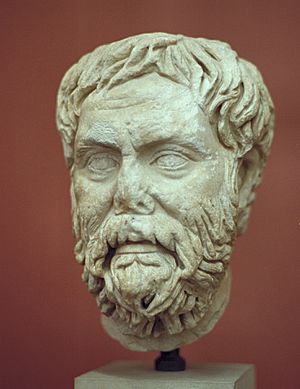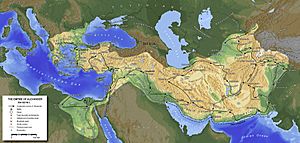Pyrrho facts for kids
Quick facts for kids
Pyrrho
|
|
|---|---|

|
|
| Born | c. 365–360 BC Elis, Greece
|
| Died | c. 275–270 BC (aged c. 85–95) Elis, Greece
|
| Era | Hellenistic philosophy |
| Region | Western philosophy |
| School | Skepticism Pyrrhonism |
|
Main interests
|
Epistemology, metaphysics, ethics |
|
Notable ideas
|
Philosophical skepticism, ataraxia, adiaphora, epoché |
|
Influences
|
|
|
Influenced
|
|
Pyrrho of Elis (born around 360 BC in Elis, Greece) was an important philosopher in Ancient Greece. He is known as the first Greek skeptic philosopher. He also founded a school of thought called Pyrrhonism.
Contents
Life of Pyrrho
Pyrrho of Elis lived from about 365/360 BC to 275/270 BC. He was from a place called Elis in Greece, near the Ionian Sea. Pyrrho was likely part of a special family called the Klytidiai. This family interpreted messages from the gods at the Temple of Zeus in Olympia. Pyrrho himself served as a high priest there.
Most of what we know about Pyrrho comes from a writer named Diogenes Laërtius. He wrote that Pyrrho was first a painter. Some of his paintings were even shown in a public gym in Elis. Later, Pyrrho became interested in philosophy after reading the works of Democritus.
Travels with Alexander the Great
Pyrrho traveled with Alexander the Great's army on his journey to India. He went as far as the "Gymnosophists" in India and the "Magi" in Persia. These travels helped shape his philosophical ideas.
After returning to Elis, Pyrrho lived a simple life. However, the people of Elis respected him greatly. They made him a high priest. The Athenians also honored him by giving him citizenship.
Pyrrho's Students
Pyrrho had several students who carried on his ideas. One of his most famous students was Timon of Phlius. Another student, Arcesilaus, also followed Pyrrho's philosophy. Arcesilaus later changed the teachings of the Platonic Academy to match Pyrrho's ideas. This led to a new type of skepticism called Academic skepticism.
Pyrrho's Philosophy
Pyrrho himself did not write any books. Most of what we know about his philosophy comes from his student Timon. Timon's writings were later preserved by other philosophers like Sextus Empiricus.
Pyrrho's main goal was to achieve a state called ataraxia. This means being free from mental worry or trouble. He believed you could reach this state by not holding strong beliefs about things you think or see.
What Pyrrho Taught
A key part of Pyrrho's philosophy was summarized by a writer named Eusebius. He quoted Aristocles, who quoted Timon. This summary is known as the "Aristocles passage." It says that things in the world are not truly one way or another. They are "indifferent, unstable, and indeterminate."
Because of this, Pyrrho believed our senses and opinions are not always true or false. So, we should not trust them completely. Instead, we should try to be without strong opinions or biases. We should say that something "no more is than is not," or "both is and is not," or "neither is nor is not." This idea is called epoché, or suspension of judgment.
Pyrrhonism Today
Centuries after Pyrrho, his philosophy was revived by a thinker named Aenesidemus. Pyrrhonism became one of the two main types of philosophical skepticism in ancient times. It was popular among doctors who believed in learning from experience rather than fixed theories.
Followers of Pyrrhonism see it as a way of life. They aim for ataraxia by practicing epoché. One way they do this is by looking at arguments for and against any idea. When arguments seem equally strong (this is called isostheneia), they decide to suspend judgment. This practice helps them achieve a calm and untroubled mind.
Indian Influences on Pyrrho
Many ancient writers, like Diogenes Laërtius, believed that Pyrrho's travels to India influenced his philosophy. They thought he learned about "incomprehensibility" and the need to "suspend one's judgment" from Indian thinkers.
However, how much India influenced Pyrrho is still debated. Some scholars point out that skepticism already existed in Greek philosophy before Pyrrho's travels. It might have been hard for Pyrrho to fully understand Indian philosophers due to language barriers. Still, some believe that Indian ideas, possibly from groups like the Ajñana or Jains, might have played a role in shaping Pyrrho's unique views.
See also
- Ajñana
- Callisthenes
- Greco-Buddhism
 In Spanish: Pirrón para niños
In Spanish: Pirrón para niños
 | DeHart Hubbard |
 | Wilma Rudolph |
 | Jesse Owens |
 | Jackie Joyner-Kersee |
 | Major Taylor |


